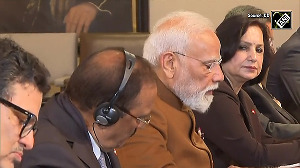With land acquisition completed and infrastructure work streamlined, India's bullet train dreams are slowly, but finally, inching closer to reality.

On a quiet day, it can take even the slickest of drivers half an hour to cross the Bandra Kurla Complex (BKC) area in Mumbai.
On a busy day, the jam-packed roads of the city's up and coming commercial hub try the patience of every commuter -- even going by Mumbai's high tolerance levels for traffic snarls.
Between the construction of the BKC station of the Mumbai Metro Aqua Line, flyover projects in the vicinity, and rapid development of real estate in the area, there has been little respite for those who come here, wriggling their way through congestion, every day to earn a living.
Sequestered from all the din lies a 1-kilometre patch of land, where nearly 800 workers toil every day, away from the public commotion. This block of rubble and earth will eventually become the birthplace of high speed rail in India, better known as bullet train.
"Is this where the bullet train will start?" asks Satish, a local vendor who works a little distance from the excavated site of the station on the Mumbai-Ahmedabad High Speed Rail (MAHSR) corridor.
"If you hadn't told me, I would not even have known. There hasn't been much disturbance overground because of the digging," he adds, apparently not feigning ignorance.
Locals say that the station's progress has been largely unobtrusive, an exception almost anywhere in India and especially in the financial capital famous for constant construction work.
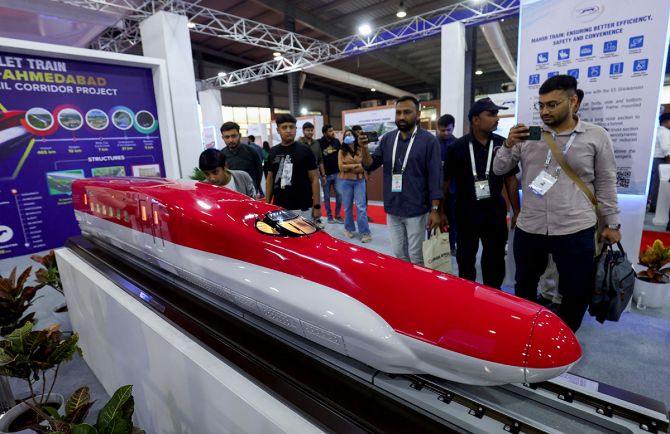
While construction is not noticeable to passersby, this site under excavation transports 500 trucks every day to dump the burrowed earth to the designated area.
The digging will extend to a depth of 32 metres, a ninth of which has been completed by a consortium of Megha Engineering and Infrastructures Ltd and Hindustan Construction Company Ltd.
The joint venture was awarded the contract in March last year, and began construction in September. With a stated deadline of 54 months, the station is expected to be commissioned by March 2028.
The 508-km long MAHSR corridor worth Rs 1.08 trillion aimed completion by 2022 when it was announced; it is expected to be delayed by at least six years, owing to political differences and technical delays.
With land acquisition completed and infrastructure work streamlined, India's bullet train dreams are slowly, but finally, inching closer to reality.
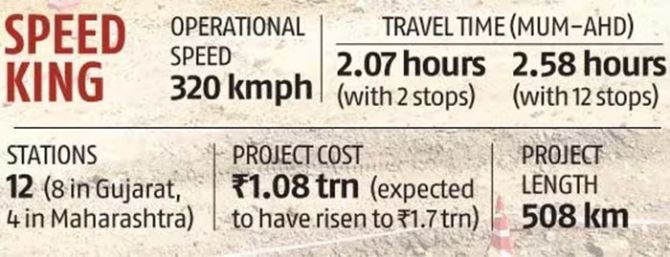
Changing gear
Last July, the National High Speed Rail Corporation Ltd (NHSRCL) issued a tender worth an estimated Rs 11,000 crore (Rs 110 billion) for the supply of 24 E5 series Shinkansen trains for the corridor, with only Japanese firms allowed to bid as part of India's agreement with Japan.
According to senior NHSRC executives present at the review of multiple MAHSR projects on Friday, the financial bid by Japanese firms Kawasaki Heavy Industries and Hitachi Rail was opened on February 29, and the contract is expected to be awarded by mid-2024 as the proposal will be assessed in the following months.
India and Japan previously finalised design changes in the trains, owing to the different climatic conditions in India.
The Centre is targeting full operation of the Mumbai-Ahmedabad corridor by 2028, a top executive of NHSRCL told Business Standard.
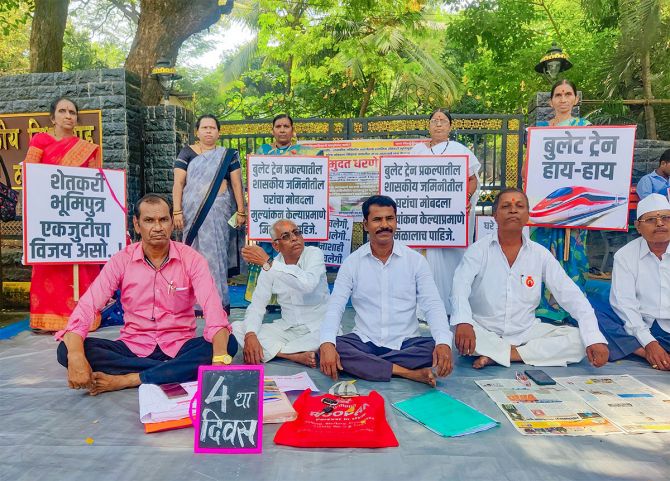
In Vikhroli, a Mumbai suburb, Afcons Infrastructure, the contractor for India's first undersea tunnel (7-km long) is working on triggered blasts to start the boring process. Three of the four shafts for the 21-km long tunnel will be followed by insertion of a tunnel boring machine.
In the same suburb, 1,700 trees were cut to make way for the project. In 2022, the Bombay high court allowed the felling of 22,000 mangrove trees for the project.
Late last year, the Union environment ministry reportedly pointed to the Maharashtra government how its battle against air pollution was also impacted due to the removal of trees. The resistance has died down after the change of government in the state.
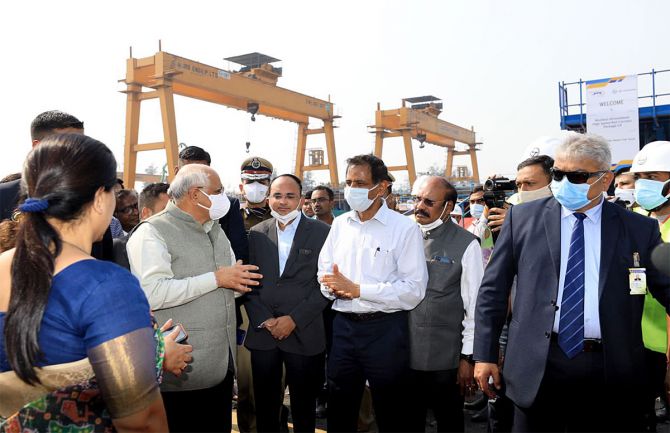
Rising costs
In 2017, former prime minister Manmohan Singh had called the project an 'exercise in vanity'. The flagship project of the Centre has been criticised often by political opponents as one that only caters to the rich.
In the six years of the project's delay, the estimated cost has been reported to have been increased by at least Rs 60,000 crore (Rs 600 billion). The Centre has taken a stance that it does not know the cost or deadline.
'The anticipated timeline and final cost can only be ascertained after award of all contract packages,' Railways Minister Ashwani Vaishnaw said in a written reply to a question in Rajya Sabha on February 9.
Government officials and executives aware of the developments said the cost had increased significantly, and the Centre might move to get revised costs vetted by high-level committees and Union Cabinet once all contracts, including the Rs 11,000 crore Shinkansen train award, had been given.
The economic internal rate of return -- an indicative benchmark calculated to assess the economic viability of projects -- is nearly 12 per cent for the country's maiden bullet train. However, it is unclear how this has been impacted with the cost escalation.
"In the case of projects like these, one plus one is not two, but 11," Vaishnaw said in response to concerns about costs, citing the economic multiplier effect of infrastructure creation.
While no decision on fares is likely to be announced before the operationalisation of the corridor, it is widely understood to be catering to the business class frequenting between Mumbai and Gujarat, such as those in the gems and jewellery industry.
The Bharat Diamond Bourse in Mumbai, is located in BKC itself, where the project starts.
"There isn't much of a use case for high speed rail in an economy like India, but it's like hosting the Olympics," a Mumbai-based infrastructure expert, who closely studied the project, said.
"It sends a message to the world that the country is capable of such projects, which has other economic benefits in terms of potential investments."
Feature Presentation: Ashish Narsale/Rediff.com










